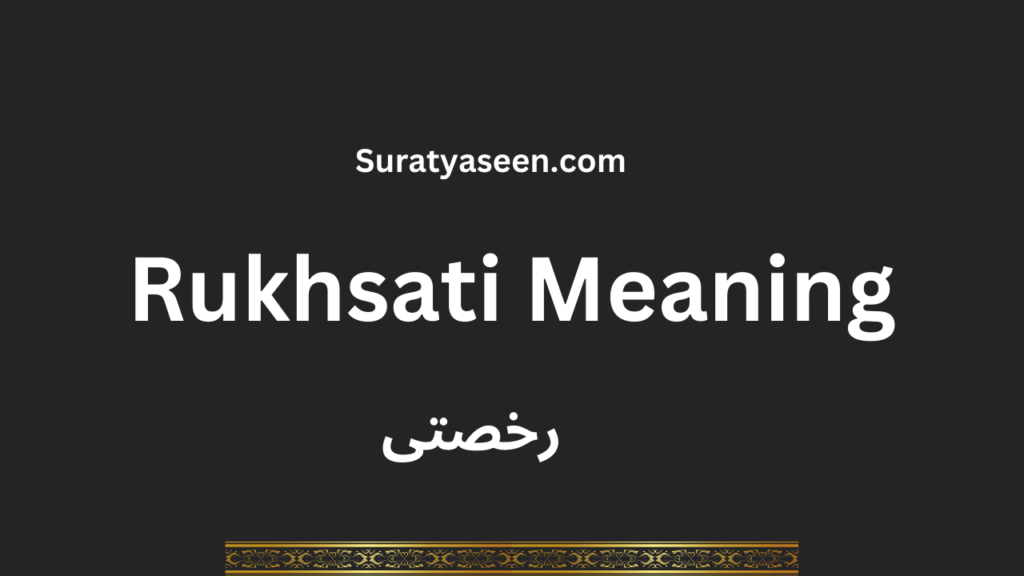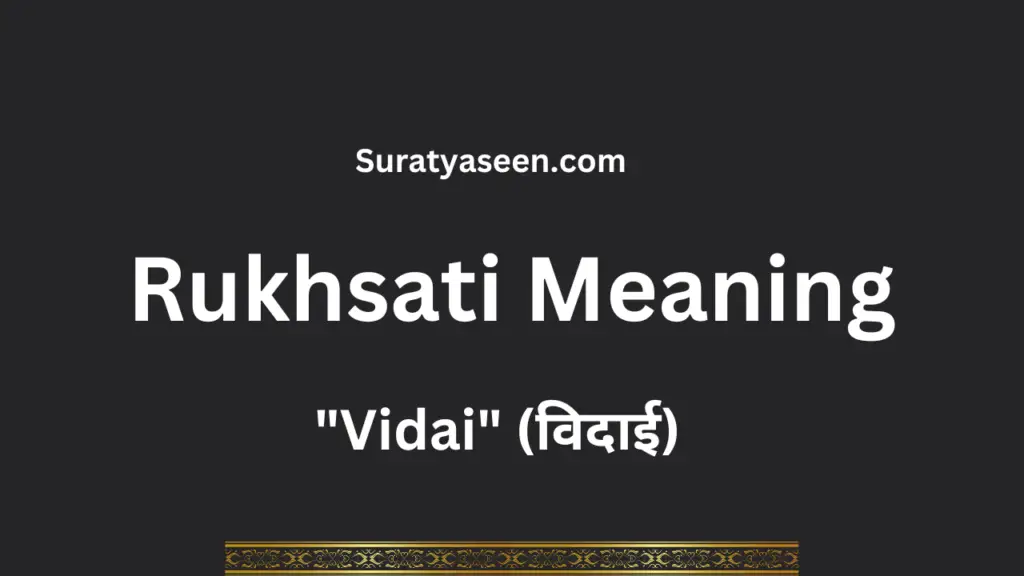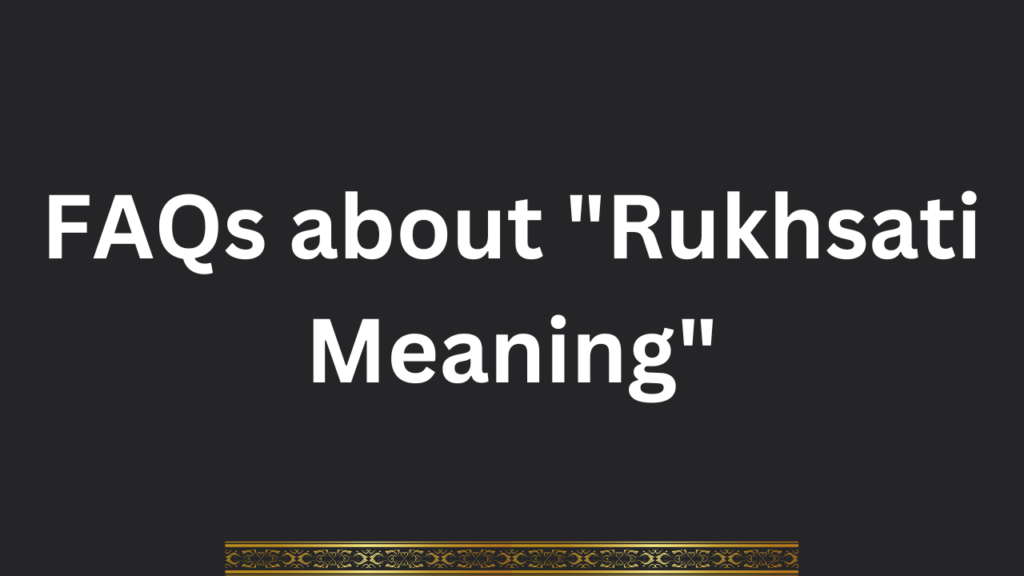Rukhsati Meaning : The Spiritual Essence of a Sacred Departure
In Islamic traditions, Rukhsati holds a profound spiritual significance as a pivotal moment in the journey of marriage. Derived from the Persian language, where “Rukh” means ‘face’ or ‘appearance,’ and “Sati” refers to ‘to be present,’ Rukhsati symbolizes the bride’s departure from her parental home to embrace a new life with her husband. Rooted in the teachings of Islam, this sacred ritual carries deep spiritual meanings, emphasizing the values of love, unity, and devotion.

Rukhsati Meaning in English

The Urdu word Rukhsati (رخساتی) means “Departure” in English, and is often used in oral communication or written narratives.
Rukhsati Meaning in Urdu

In Urdu, “Rukhsati” (رخصتی) also refers to the ritual of a bride leaving her parental home after her wedding. As mentioned earlier, it is an emotional moment when the bride bids farewell to her family and departs for her husband’s home to begin her married life with him and his family. The term “Rukhsati” is commonly used in Pakistan and other Urdu-speaking regions to describe this important aspect of a wedding ceremony.
Rukhsati Meaning in Hindi

“Rukhsati” (रुखसती) is an Urdu word commonly used in Hindi as well, and it refers to the ritual of a bride leaving her parental home after her wedding. In Hindi, it is also known as “Vidai” (विदाई). During this emotional moment, the bride says farewell to her family and moves to her husband’s home to begin her new life with him and his family. It is a significant and sentimental part of Indian weddings.
Embracing the Islamic Perspective
In Islamic teachings, marriage is considered a sacred bond ordained by Allah (SWT) that unites two souls in love and harmony. Rukhsati is a momentous event in this journey, symbolizing the bride’s transition from her natal home to her husband’s dwelling. This transition is guided by the principles of compassion, respect, and understanding, with both partners supporting each other in their new roles.
The Sanctity of Rukhsati
Rukhsati embodies the Islamic belief in the preservation of family ties, as the bride departs her home with the blessings and prayers of her loved ones. Prophet Muhammad (peace be upon him) emphasized the importance of maintaining strong family bonds and treating in-laws with kindness and affection. Rukhsati signifies the continuity of these values as the bride embraces her new family with love and humility.
A Moment of Emotional and Spiritual Reflection
As the bride leaves her parental home, emotions intertwine with spiritual reflections. It becomes a time of deep gratitude for the nurturing and love received from her parents, as well as a time to seek Allah’s blessings and guidance for the new chapter in her life. Similarly, the groom is reminded of his responsibilities as a husband and protector, seeking Allah’s help to fulfill these duties with wisdom and patience.
Strengthening the Faithful Bond
Rukhsati emphasizes the importance of building a strong bond between the couple, founded on faith and devotion to Allah. As they leave for their new home, they embark on a journey of togetherness, supporting and uplifting each other through life’s trials and joys. The act of Rukhsati serves as a spiritual commitment to foster a lifelong partnership rooted in love, compassion, and mutual respect.
Embracing Islamic Values in the New Abode
The new home becomes a sacred space where the couple strives to embody Islamic values. It is a place to pray together, seek knowledge, and strengthen their faith as a unit. Rukhsati is a reminder that Allah is the center of their lives, and their love for each other is strengthened by their love for the Creator.
Conclusion
In Islam, Rukhsati carries a spiritual essence that transcends the physical act of departure. It symbolizes the journey of two souls coming together in love and devotion, seeking Allah’s blessings and guidance as they embark on a lifelong companionship. The Islamic perspective of Rukhsati emphasizes the significance of family ties, mutual respect, and nurturing a faithful bond in the sacred union of marriage. As couples partake in this sacred tradition, they embrace the spiritual teachings of Islam, fostering an unbreakable connection that draws them closer to each other and to Allah (SWT).
FAQs about “Rukhsati Meaning”

What does “Rukhsati” mean?
“Rukhsati” is a term derived from the Persian language, where “Rukh” means ‘face’ or ‘appearance,’ and “Sati” refers to ‘to be present.’ In the context of South Asian weddings, Rukhsati symbolizes the bride’s departure from her parental home to begin a new life with her husband’s family.
Is Rukhsati specific to a particular culture or religion?
Rukhsati is a tradition commonly practiced in South Asian cultures, including countries like India, Pakistan, and Bangladesh. It is not specific to any particular religion but is prevalent among Muslims, Hindus, Sikhs, and others.
What is the significance of Rukhsati in a wedding ceremony?
Rukhsati holds deep emotional and cultural significance. It marks the transition of the bride from her natal home to her marital home, signifying the beginning of a new phase in her life as a daughter-in-law and wife.
When does Rukhsati take place during a wedding?
Rukhsati typically takes place after the main wedding rituals, such as the exchange of vows and rings, are completed. The exact timing may vary based on cultural traditions and family preferences.
What are the emotions associated with Rukhsati?
Rukhsati is a bittersweet moment filled with a mix of emotions. It can be emotional and teary as the bride bids farewell to her family, but it also brings excitement and happiness for the new journey she is about to embark on with her spouse.
Are there any unique customs or rituals associated with Rukhsati?
Yes, Rukhsati customs can vary based on regional and cultural influences. For instance, in some communities, the bride may throw rice over her shoulder before leaving, symbolizing prosperity. In others, traditional songs and dances may accompany the departure.
How do families prepare for Rukhsati?
Families prepare for Rukhsati with great care and attention. The bride’s family may give her gifts, blessings, and heartfelt advice before bidding her farewell. The groom’s family welcomes the bride with open arms, creating a warm and loving atmosphere in her new home.
Is Rukhsati still relevant in modern weddings?
Yes, Rukhsati remains relevant in modern weddings as it holds deep cultural and emotional significance. However, as society evolves, some families may adapt certain aspects of the tradition to align with contemporary values and practicalities.
Does Rukhsati have any spiritual significance in Islam?
In Islam, Rukhsati is viewed as a sacred and significant moment in the journey of marriage. It symbolizes the bride’s transition from her parental home to her husband’s home, emphasizing the preservation of family ties and the importance of unity and compassion.
How does Rukhsati strengthen family bonds?
Rukhsati strengthens family bonds by creating a bridge between the bride’s natal family and her new marital family. It fosters a sense of belonging and unity, reminding everyone of the shared love and values that connect them, regardless of physical distance.